World Trade Center
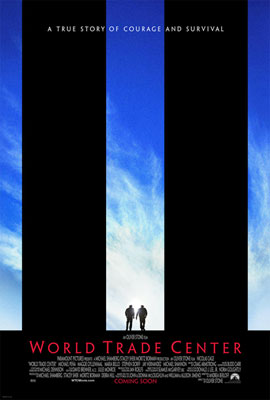
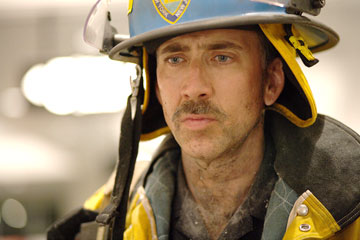 When Port Authority Sergeant John McLoughlin (Nicholas Cage) and his men arrive on the scene of the World Trade Center after the first plane has crashed into one of the towers, they find complete chaos all around them. The papers from within the offices of the tower are raining down onto the streets, people are diving out of windows, and a layer of smoke fills the air. John and a few of his men, including Officer Will Jemeno (Michael Pena from Crash), head inside the complex underneath the twin towers to search for supplies for their attempt to rescue the people from the second tower. While the men are in the complex, the second tower is hit by another plane, causing the entire ceiling to collapse in on them. John and Will are the only survivors (except for one other officer who decides to shoot himself shortly after the collapse occurs), and must try to keep each other alive, hoping that someone will hear their cries for help as they care held down to the ground by massive pieces of debris. Meanwhile, the wives of the individual men, Allison (Maggie Gyllenhaal) and Donna (Maria Bello), wait anxiously for any news about their husbands.
When Port Authority Sergeant John McLoughlin (Nicholas Cage) and his men arrive on the scene of the World Trade Center after the first plane has crashed into one of the towers, they find complete chaos all around them. The papers from within the offices of the tower are raining down onto the streets, people are diving out of windows, and a layer of smoke fills the air. John and a few of his men, including Officer Will Jemeno (Michael Pena from Crash), head inside the complex underneath the twin towers to search for supplies for their attempt to rescue the people from the second tower. While the men are in the complex, the second tower is hit by another plane, causing the entire ceiling to collapse in on them. John and Will are the only survivors (except for one other officer who decides to shoot himself shortly after the collapse occurs), and must try to keep each other alive, hoping that someone will hear their cries for help as they care held down to the ground by massive pieces of debris. Meanwhile, the wives of the individual men, Allison (Maggie Gyllenhaal) and Donna (Maria Bello), wait anxiously for any news about their husbands.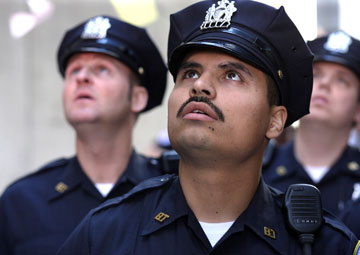 The big mistake that Oliver Stone makes with World Trade Center is that he simply aims too small. By focusing on only these two men and their families, he all but forgets about everyone else. Aside from a touching scene late in the film where Donna comforts a woman at a hospital who lost her adult son in the disaster, no mention at all is made of anyone who gave their lives. John and Will enter the underground complex with a small group of men, but as soon as the ceiling comes down, the other men who died are completely forgotten about. We never get to hear about their wives or families who were probably doing the same thing as Allison and Donna, only to be met with much grimmer news. And what about the officer who gives up hope of ever being rescued and shoots himself? As soon as he's out of the picture, he's never mentioned again, except for one single throwaway line late in the film. For a movie about such a tragic day and moment, the movie plays it far too safe. It wants to concentrate simply on these two men who everyone knows made it out alive. It doesn't want to shock, and it doesn't want to face reality that thousands of others were not so lucky. To be fair, the movie does list the names of some fallen officers at the end of the movie, but by that point, it's too little too late.
The big mistake that Oliver Stone makes with World Trade Center is that he simply aims too small. By focusing on only these two men and their families, he all but forgets about everyone else. Aside from a touching scene late in the film where Donna comforts a woman at a hospital who lost her adult son in the disaster, no mention at all is made of anyone who gave their lives. John and Will enter the underground complex with a small group of men, but as soon as the ceiling comes down, the other men who died are completely forgotten about. We never get to hear about their wives or families who were probably doing the same thing as Allison and Donna, only to be met with much grimmer news. And what about the officer who gives up hope of ever being rescued and shoots himself? As soon as he's out of the picture, he's never mentioned again, except for one single throwaway line late in the film. For a movie about such a tragic day and moment, the movie plays it far too safe. It wants to concentrate simply on these two men who everyone knows made it out alive. It doesn't want to shock, and it doesn't want to face reality that thousands of others were not so lucky. To be fair, the movie does list the names of some fallen officers at the end of the movie, but by that point, it's too little too late. It's a shame that Stone loses his nerve as the film goes on, because the opening 15 or 20 minutes are downright brutal in their depiction of the chaos these officers found when they arrived on the scene. The film opens with such unflinching honesty of the horror of that day with fire rising all around, complete with people covered in soot and ash and blood. The men watch helplessly as people within the towers jump to their deaths instead of waiting to be rescued. There is so much detail and realism, it's almost like you're there. It certainly helps that Stone's eye for detail goes right to the billboards that are displayed on buildings and the sides of busses, as all of them are taken directly from the time of the event. No expense was obviously spared during these early scenes that it becomes almost baffling why Stone would do such a complete turn around and lose every bit of his nerve before the half hour mark. It's like looking at two different movies, the first half hour being directed by a man confident in his vision, and the second being directed by someone under intense studio pressure to turn this into a feel good movie that will lift our spirits. The two styles don't mix together, making World Trade Center seem disjointed. Equally disjointed are the number of subplots that are introduced, then either dropped completely or not given enough time to develop. Aside from a Marine who risks everything to make it to the site of the disaster (Michael Shannon), not one single character outside of the main characters' family is given any real screen time to develop.
It's a shame that Stone loses his nerve as the film goes on, because the opening 15 or 20 minutes are downright brutal in their depiction of the chaos these officers found when they arrived on the scene. The film opens with such unflinching honesty of the horror of that day with fire rising all around, complete with people covered in soot and ash and blood. The men watch helplessly as people within the towers jump to their deaths instead of waiting to be rescued. There is so much detail and realism, it's almost like you're there. It certainly helps that Stone's eye for detail goes right to the billboards that are displayed on buildings and the sides of busses, as all of them are taken directly from the time of the event. No expense was obviously spared during these early scenes that it becomes almost baffling why Stone would do such a complete turn around and lose every bit of his nerve before the half hour mark. It's like looking at two different movies, the first half hour being directed by a man confident in his vision, and the second being directed by someone under intense studio pressure to turn this into a feel good movie that will lift our spirits. The two styles don't mix together, making World Trade Center seem disjointed. Equally disjointed are the number of subplots that are introduced, then either dropped completely or not given enough time to develop. Aside from a Marine who risks everything to make it to the site of the disaster (Michael Shannon), not one single character outside of the main characters' family is given any real screen time to develop.The main thing that ultimately sinks the film is that it seems to constantly be trying to remind us it's only a movie. It takes us away from the action with some clumsily placed flashbacks or fantasy sequences that come out of nowhere. If they were used to develop the characters further, I wouldn't have minded so much, but they don't really tell us anything that their dialogue didn't already. The film is also not helped by a sappy and overly sympathetic music score that blasts throughout the film, trying to manipulate our every emotion. Everything seems so calculated and overly planned that it made me miss the unflinching chaos of the film's opening moments all the more.
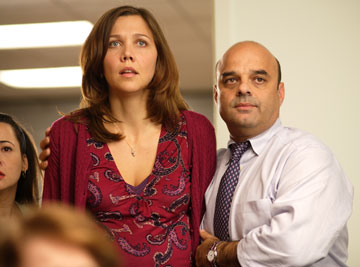 Despite its flaws, the film is certainly well made in just about every way. All of the lead performances are strong, especially Nicholas Cage and Michael Pena, who are given the unenviable task of doing almost all of their scenes lying under piles of immense rubble. As their wives, Maggie Gyllenhaal and Maria Bello are sympathetic and believable, even if the screenplay by Andrea Berloff could have gone deeper into their characters and the relationships with their husbands. The film also has a strong look and style. Aside from the previously mentioned eye for detail, Stone recreates the living nightmare that must have been the ruins of the Center itself. The special effects are realistic and never so grand that they take us out of the reality of the situation. I'm sure the real life situation for the two men must have been much worse, but I now have a much greater understanding for what they must have went through during that period they were trapped.
Despite its flaws, the film is certainly well made in just about every way. All of the lead performances are strong, especially Nicholas Cage and Michael Pena, who are given the unenviable task of doing almost all of their scenes lying under piles of immense rubble. As their wives, Maggie Gyllenhaal and Maria Bello are sympathetic and believable, even if the screenplay by Andrea Berloff could have gone deeper into their characters and the relationships with their husbands. The film also has a strong look and style. Aside from the previously mentioned eye for detail, Stone recreates the living nightmare that must have been the ruins of the Center itself. The special effects are realistic and never so grand that they take us out of the reality of the situation. I'm sure the real life situation for the two men must have been much worse, but I now have a much greater understanding for what they must have went through during that period they were trapped.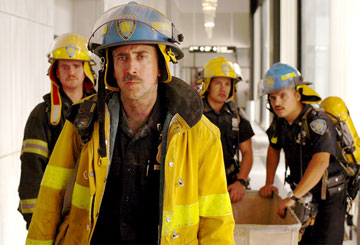
In the end, World Trade Center is just too narrow in its focus. Perhaps a lot of this has to do with the fact that Stone relied very heavily on the personal accounts of the two actual men. Instead of just focussing on the experiences of these men, I think Stone should have spent more time focussing on the nation itself. He gives us plenty of scenes of Americans and people all over the world watching the events unfold on TV, but he seldom lets us hear what they have to say about it, or what they are thinking. United 93 (which as of the time I am writing this stands as the best film of the year so far) took no sides. There were no heroes, no villains, and no lead characters. We were simply watching history repeat itself. Stone starts off with this approach, then loses his way when he follows these men into the building. I kept on wishing he had stayed outside.
See the movie times in your area or buy the DVD at Amazon.com!






0 Comments:
Post a Comment
<< Home